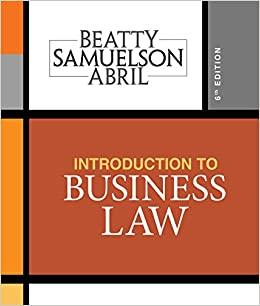Question
Bonus: A store manager must hire a clerk to work in her store. The sales of the store are uncertain and also a function of
Bonus: A store manager must hire a clerk to work in her store. The sales of the store are uncertain and also a function of how hard the clerk works. If the clerk works hard (high effort) then there is a 75% chance that sales will be $500 per day and a 25% chance that they will be $100 per day. If the clerk does not work hard (low effort) then there is only a 25% chance that
sales will be $500 and a 75% chance that they will be $100. The store manager is risk neutral and her utility is the expected profits of the store i.e. Umanager = Expected (Sales - Wages). The clerk is risk averse. In addition, the clerk does not like to work hard so exerting high effort lowers her utility. Her utility function is given by Uclerk(w,e) = w0.5- e where e is either 0 (low effort) or 4 (high effort). Finally, assume that the clerk could work somewhere else where her total utility would be 10. Thus, she will only work in this store if the total utility of working here is at least 10. Below, assume that if the clerk is indifferent between working here and somewhere else then she will work here and that if she is indifferent between high effort and low then she will choose high.
Observable Effort: Assume that the manager can observe the effort level of the clerk. Thus, she can offer two wages, WH (the wage for high effort) and WL (the one she pays for low effort.
a) What is the minimum value of WH that the manager can offer to the clerk that she will accept to work in the store and exert high effort? What is the minimum value of WL to elicit low effort?
b) Given your values for WH and WL, show that the manager will earn higher profits by offering WH and getting high effort than by offering WL and getting low effort.
Unobservable Effort: For the remainder, assume that the manager cannot observe the effort level. Suppose that the manager offers a single wage, W, which does not depend on effort.
c) If the clerk works in the store at a flat wage of W, then how much effort will she exert? d) Given this answer, what wage will the manager offer? What are the expected profits?
Although she cannot observe effort, the manager can observe sales. Thus, she can offer two wages, W100 (the wage she pays when sales are $100) and W500 (sales are $500).
e) What is the clerk's expected utility when effort is high? What is it when effort is low?
f) The clerk will only exert high effort if her expected utility doing so is higher than when
she exerts low effort. Use your expressions from (e) to write this inequality. This
condition is known as Incentive Compatibility (IC).
g) The clerk will only work for this manager if the expected utility from doing so exceeds
the utility she could get from working elsewhere. Assuming she is exerting high effort, use your expressions from above to write this inequality. This is known as the Participation Condition (PC).
h) Given that the store manager would like to offer the lowest wages that elicit high effort, use IC and PC to find the values of W100 and W500 .
i) Show that if the store manager offers the wages these wages then her expected profits are lower than in part (b) but higher than in (d). Note: this is an example of using sales commissions to ameliorate a moral hazard problem.
Step by Step Solution
There are 3 Steps involved in it
Step: 1

Get Instant Access to Expert-Tailored Solutions
See step-by-step solutions with expert insights and AI powered tools for academic success
Step: 2

Step: 3

Ace Your Homework with AI
Get the answers you need in no time with our AI-driven, step-by-step assistance
Get Started


